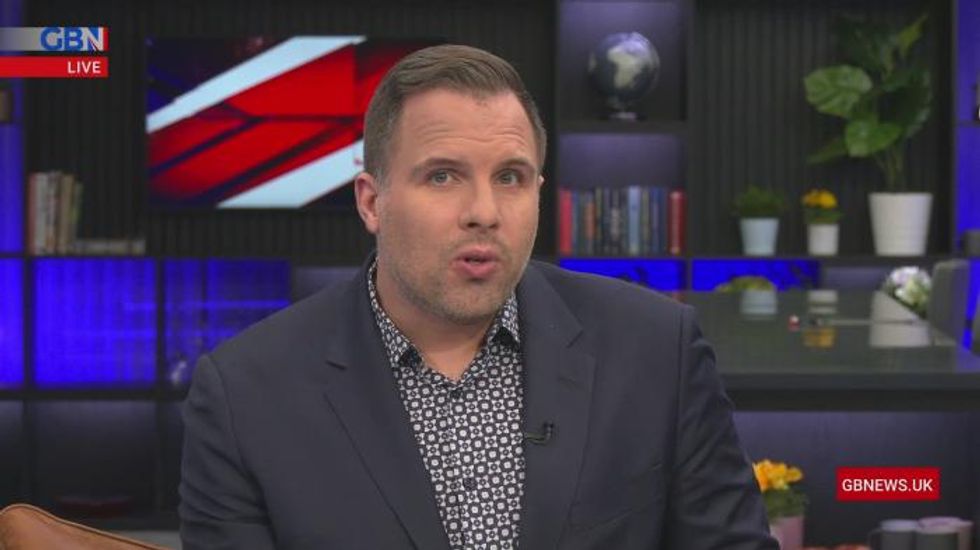The left-wing, the woke, the politically correct and the Labour party don’t want to talk about this worrying trend because they’ve decided trans rights trumps the rights of those born biologically female when it comes to sport
Don't Miss
Most Read
Trending on GB News
Women’s sport is under threat in Britain and, if we’re not careful, it’s very existence could soon be erased.
The left-wing, the woke, the politically correct and the Labour party don’t want to talk about this worrying trend because they’ve decided trans rights trumps the rights of those born biologically female when it comes to sport.
But, as a great lover and proponent of women’s sport, I will – and we all must – before it’s too late.
What we’ve learned this week is that the suggestion the disturbing cases of the US swimmer Lia Thomas and the New Zealand weightlifter Laurel Hubbard were unique and would not be repeated here in the UK has now been thrown into doubt.
British Cycling made sure of that after Emily Bridges was included on the entry list for the National Omnium Championships at the Derby Arena this weekend.
Brett Davis
Now Emily, until the past few months, was a very successful male cyclist called Zach Bridges.
In 2018, Zach became the national junior men’s record holder over 25 miles by completing the course in just 47 minutes and 27 seconds.
By contrast, Hayley Simmonds, who holds the female senior record in the same event, completed it two minutes slower in 49 minutes and 28 seconds.
As recently as last month, Bridges – who we’re told has been transitioning for some time – was competing in men’s events.
In February, Bridges competed at the British University Championships in Glasgow, where they won gold in the points race.
Brett Davis
But, in one of the most maddening and consequential decisions made by a British sporting body, Bridges was permitted to compete as a woman against biological women, including the five-time Olympic champion Dame Laura Kenny.
How can this possibly happen?
Well, British Cycling has a Stonewall-approved woke policy that says they must “accept all participants in the gender they present” as long as they have testosterone below a certain level.
Bridges, who could be in line to ride for Wales at the Commonwealth Games this summer and possibly even Team GB at the 2024 Paris Olympics, apparently began hormone treatment last year and was initially considered eligible.
Studies have shown that doesn't reverse the development of anatomical advantages related to, among other things, height, pelvic architecture and leg bones during male puberty, not even close.
But in this current world of cancel culture, where Keir Starmer and many leading Labour politicians refuse to say if a woman can have a penis, women cyclists are too terrified to speak up against this very obvious madness.
A well-placed source told the Daily Mail today…
“Everyone is afraid to say anything for fear of retribution.”
And Olympic swimming medallist Sharron Davies, who has been bravely campaigning on this issue for years, despite death threats, said…
“British Cycling ought to be ashamed of themselves. I have had quite a few of the girls very distressed on the phone. They are frustrated and disappointed.”
Thankfully, sanity eventually prevailed - but not until prominent sporting figures like Sharron and outlets like GB News began speaking out on behalf of those cowed figures in the cycling world.
Just before we went to air, British Cycling confirmed Emily would no longer participate in Saturday's event after being informed she was not eligible under guidelines set out by the UCI, the world governing body for sports cycling.
In the same breath, they called for the formation of a coalition to press the issue of trans athletes, making it clear just what lengths they will go to to ensure women struggle to get a fair fight.
In their statement, British Cycling jumped feet first into the culture wars by saying the conversation around Emily was "bigger than one race and one athlete", waved off a wealth of science by stating that "far more needs to be done, collectively, before any long-term conclusions can be drawn", all the while promising they would achieve "fairness in a way that maintains the dignity and respect of all athletes."
Do they truly mean ALL athletes? Because for some female competitors, that ship may have sailed with this whole saga.
I am all for an equal society – Emily should be accepted and welcomed into the world.
But not into the world of competitive women’s sports, I’m afraid.
I’m very clear on this. And it’s not about discrimination, it’s about fairness.
Sporting bodies have to limit competitors to the biological sex in which they were born.
Otherwise, I’m fearful, women’s sport – something I love and champion in my role as a supporter of the all-conquering London Pulse netball team – is on a slippery slope to oblivion.











